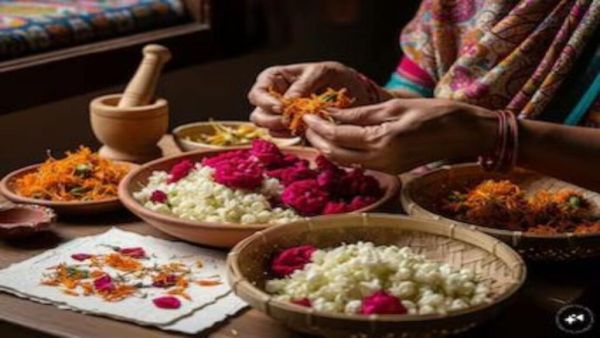
News India Live, Digital Desk: Herbs in Autumn : When winter knocks and ‘Autumn’ arrives, a special change is felt in the weather. This is the time when our nature also changes, and Ayurveda believes that with this change, a change in our eating habits is also necessary, so that we remain healthy and avoid diseases. Knowledge of what to eat and what to avoid in winter makes us physically and mentally strong. If you want to stay fit without disease in this season, then adopting these Ayurvedic suggestions will be very beneficial for you.
Identification of winter season according to Ayurveda:
In Ayurveda, autumn (which is generally considered to be from October to December, i.e. mild winter and then the arrival of cold) is considered to be the time of increase of Pitta dosha and Vata dosha. During this time, our digestive system becomes a little weak and we should consume such things which are easily digested and make the body strong from inside. It is very important to know these things for ‘winter health’.
What to eat in autumn (winter diet tips):
- Consumption of ghee and oil (removes dryness):
Dryness in the air increases in this season. Consuming things like ghee, olive oil or sesame oil is beneficial. Use ghee or oil in pulses and vegetables, which pacifies Vata dosha and also keeps the skin soft. It is good for ‘autumn skin care’. - Sweet and bitter juices (to pacify pitta):
Honey, jaggery, sweet fruits (apple, pear, pomegranate), and bitter-tasting foods like bitter gourd or fenugreek seeds also help in balancing pitta. Sweet food pacifies both Vata and Pitta. - Pulses and sprouts:
Consume light and easily digestible pulses like moong dal, masoor dal. Sprouted grains are also rich in nutrients and strengthen the body in this season. - Hot Spices and Herbs:
Include hot spices like ginger, garlic, turmeric, black pepper, cloves, cinnamon in your food. These increase immunity and give the body strength to fight diseases. Decoction of herbs like Tulsi and Giloy is also beneficial. This is necessary to maintain ‘immunity in winter’. - Lukewarm water: Drink lukewarm water throughout the day. It helps in removing toxins from the body and improves digestion.
What not to eat in autumn (winter avoidance):
- Very spicy or sour food:
Too much spicy, sour or spicy food can also increase Pitta Dosha, causing problems like burning sensation or acidity in the stomach. - Fried and Junk Food:
Due to being heavy to digest, fried foods and processed junk foods should be avoided in this season. These slow down digestion and can cause stomach problems. - Excessive consumption of curd and buttermilk:
Curd and buttermilk may be beneficial during summer, but their excessive consumption during winter can increase the problem of cough and cold. Avoid excessive consumption of ‘curd in winter’. - Foods that cause gas in the stomach:
Some pulses (like kidney beans, chickpeas) or vegetables like cabbage can cause gas and bloating. Consume them in limited quantity or eat them only after cooking them well.
By adopting these simple rules of Ayurveda, you will not only be protected from diseases in the winter season, but will also feel energetic and happy from within. By adopting ‘Ayurvedic lifestyle’ you can stay ‘healthy in winters’.
-
Use the remaining flowers after Diwali in this way, you will be able to use them for many days…

-
Life Gets Much Better For 3 Zodiac Signs After October 23, 2025

-
65 clients, 35 thousand rupees for talking for an hour… Woman becomes ‘sugar baby’ from teacher and tells why married men approach her

-
YouTube unveils “Likeness detection” to protect creators from deepfake misuse

-
Life360 ventures into pet tech with the launch of a new GPS tracker
